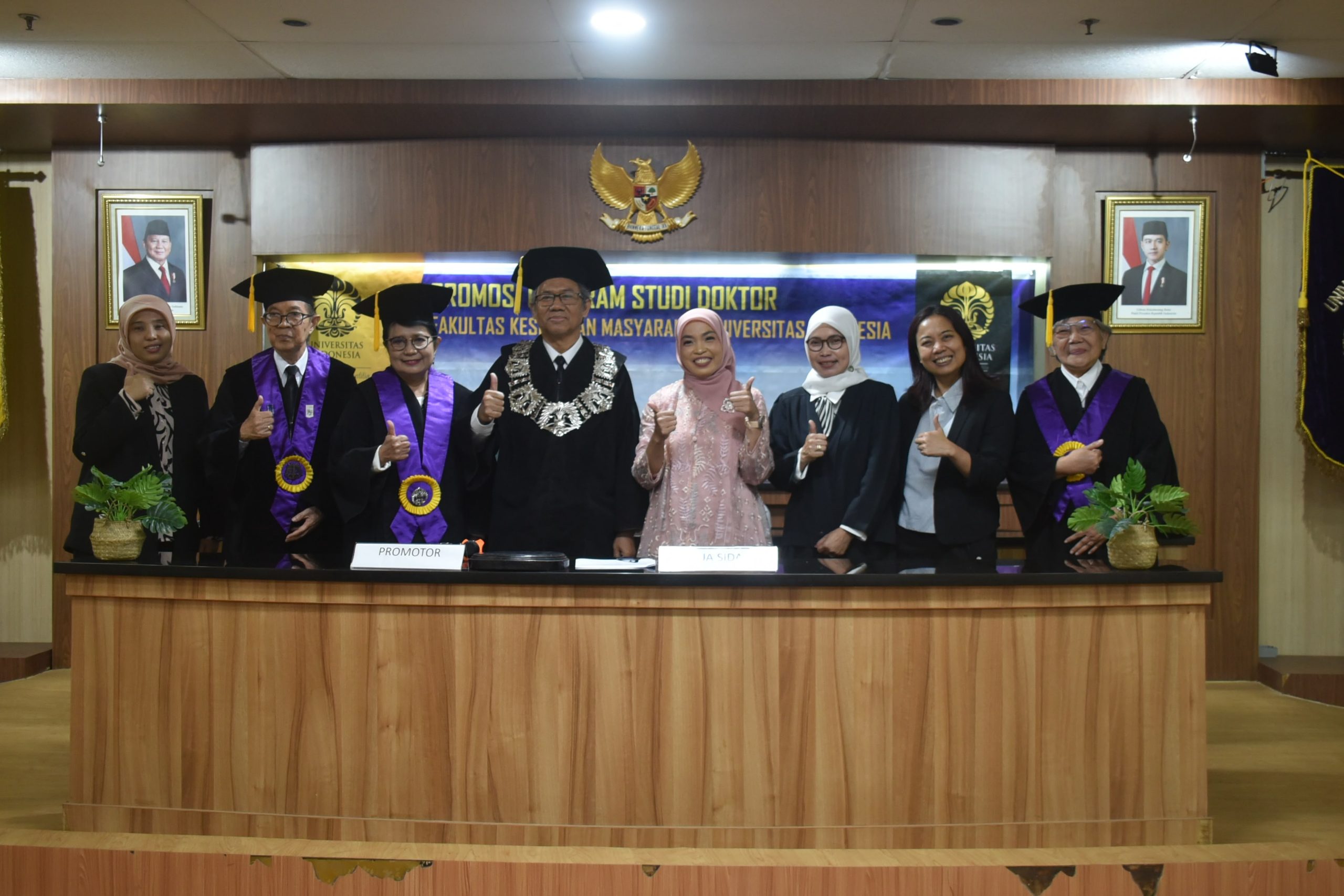The Faculty of Public Health (FPH), Universitas Indonesia (UI), held an open doctoral promotion session in Epidemiology with a specialization in Community Epidemiology for doctoral candidate Jumriani Anshar on Thursday, June 26, 2025, at the Doctoral Promotion Room of FPH UI. Jumriani successfully defended her dissertation entitled “The Relationship Between Psychosocial Stress Dynamics Among Healthy Pregnant Women and Full-Term Birth Weight (A Longitudinal Study of Pregnant Women in Makassar City).” Her research revealed that persistent psychosocial stress during pregnancy is significantly associated with reduced full-term birth weight. The session was chaired by Dr. Sherly Saragih Turnip, S.Psi., M.Phil., Ph.D., Psychologist, who also served as Chair of the Examination Committee.
Jumriani’s research was motivated by the high prevalence of mental health disorders globally and nationally. According to the WHO (2022), the global prevalence of mental disorders reached 13%, with depression and anxiety being the two most common. In Indonesia, national depression prevalence is recorded at 6.1%, while in South Sulawesi, it is even higher at 7.8%. Psychosocial stress during pregnancy is suspected to be one of the factors influencing birth weight. Biologically, stress can trigger increased cortisol levels through the activation of the HPA axis (hypothalamus-pituitary-adrenal).
Increased cortisol levels, especially in the third trimester, risk disrupting blood flow to the fetus, leading to lower birth weight. However, most prior studies only measured stress at a single time point and rarely combined psychosocial assessments with cortisol biomarkers longitudinally. This dissertation attempts to fill that gap by integrating psychosocial and biological approaches throughout pregnancy.
The research found that 36.52% of pregnant women experienced persistent psychosocial stress during their pregnancy. Moderate to severe stress was identified in 43.26% of women in the first trimester, dropping to 35.96% in the second trimester, and rising again to 43.82% in the third trimester. Physiologically, cortisol levels increased as pregnancy progressed, averaging 7.13 ng/mL in the first trimester, 9.15 ng/mL in the second, and 11.79 ng/mL in the third.
High cortisol levels were negatively correlated with birth weight. The study also demonstrated a significant association between persistent psychosocial stress and decreased full-term birth weight. Women who experienced moderate to severe psychosocial stress from the first trimester were more likely to deliver babies with lower birth weights. The average decrease in birth weight among this group was 144.459 grams in the first trimester (p = 0.040), 188.261 grams in the second trimester (p = 0.004), and 215.665 grams in the third trimester (p = 0.002). These findings indicate a dose-response pattern, where the frequency and persistence of stress during pregnancy correlate with greater reductions in birth weight.
“Other factors influencing full-term birth weight include the mother’s perception of spousal support, weight gain during pregnancy, pregnancy-induced hypertension, and the completeness of antenatal care (ANC) visits,” stated the promovenda. These findings emphasize that psychosocial stress affects not only maternal mental health but also has serious implications for fetal health.
Based on these findings, the promovenda recommends integrating psychosocial stress screening into standard antenatal care services at community health centers (puskesmas), accompanied by counseling services for pregnant women experiencing high stress levels. ANC services should be strengthened by emphasizing the importance of the 10T examination, particularly for early detection of hypertension, anemia, and psychosocial issues. Additional community-based support for high-risk pregnant women is also crucial.
She further proposed developing a data-based monitoring system to evaluate ANC coverage and the incidence of psychosocial stress among pregnant women. “Such data could be integrated into the maternal and child health surveillance system to support more effective intervention planning,” said Jumriani. As part of preventive efforts, the provision of valid assessment tools such as the Edinburgh Postnatal Depression Scale (EPDS), as well as training for health workers in early identification and intervention of maternal psychosocial stress, are considered essential. “Collaboration with the Indonesian Clinical Psychology Association could strengthen the field implementation of this policy,” she added.
Based on the decision of the Doctoral Examination Chair, Jumriani graduated with honors (cum laude), earning a GPA of 3.96. She is the 14th graduate of FPH UI’s Epidemiology Doctoral Program in 2025, the 129th graduate of the program overall, and the 462nd doctoral graduate of FPH UI. Throughout her dissertation process, Jumriani was supervised by her main advisor, Prof. Dr. Asri C. Adisasmita, M.P.H., M.Phil., Ph.D., and co-advisors Prof. Dr. dr. Sudarto Ronoatmodjo, S.K.M., M.Sc., and Dr. dr. Farid Husin, Sp.OG(K), M.Kes., MH.Kes.
Serving as examiners were Prof. Dr. dr. Sabarinah Prasetyo, M.Sc.; Dr. Trisari Anggondowati, S.K.M., M.Epid., Ph.D.; Dr. Indra Fajarwati Ibnu, S.K.M., M.A.; and Dr. Ansariadi, S.K.M., M.Sc.PH., Ph.D. As a center of excellence in community epidemiology, FPH UI continues to produce doctoral graduates who are not only academically outstanding but also make meaningful contributions to health policy development at both national and regional levels. (DFD)

